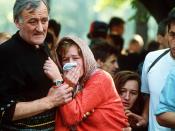The definition of bereavement, (which literally means to be deprived by death) is the objective event of loss caused by the death of someone significant (Ott). During a person's life there will be many varied experiences of loss, but the individual's responses to loss and bereavement will be dissimilar to one another. Death is hard to deal with for everyone, but for children especially. Studies show that children view death in various ways at different age periods. During these ages children need help and guidance from their parents and or social workers during the grieving process. The first step is to help them feel a part of the whole experience, doing this will allow them to deal with the death. Counseling by the parent or social worker is the next step. The main roles for this person should be to just listen while the child talks; this is especially helpful for understanding the child's inner feelings.
It is also valuable because it gives the child a chance to express his/her self which in turn relieves certain tensions such as anxiety, helplessness, gloom and hopelessness. In order to help children get through the grieving process the helper, be that parent or social worker, must consider the age and maturity level of the child and counseling should be centered on the limitations of those statistics.
Infants are one group with no real understanding of death, but they react to the ways their parents' actions change due to a loss. When the physical love that a parent can provide is suddenly missing, the child will usually have fears of separation. Infants are also very tuned in to their parents' feelings of stress and sadness. In relation to these feelings there might be noted physical expressions such as: crying, crankiness, rashes and clinging.


